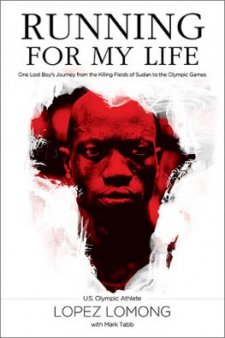When Lopez Lomong was water baptized in a refuge camp in Kenya as a teenager, his name was changed from Lopepe to Joseph, and although he continues to use his childhood nickname, Lopez, this man is a modern-day Joseph in almost every way.
Kidnapped from his mother’s arms by Sudanese rebels who raided his church at the age of six, Lopez saw death up-close before most children can grasp of the concept.
The story of his escape from the rebel prison camp is electrifying and inspiring. He compares it with the apostle Peter’s miraculous escape from prison, and rightly so.
When Lopez didn’t make it back to his village, he found himself in a Kenyan refuge camp, where he lived for almost a decade. Woven through a heart-breaking description of growing up in the camp, Lopez somehow finds renewed faith in God and learns valuable life lessons that shape him into a very special young man.
One thing he learned to do well was run.
As the camp grew, the number of boys who wanted to play soccer every day became difficult to manage, so the older boys made a rule: Everyone had to run one lap around the camp before he could report to the soccer field. The first ones back would be the first ones to play. One lap around the camp was 33 kilometers – about 18 miles.
One day at the camp, a U.N. worker announced that a program had been set up to send 3500 boys to live in America. Catholic Charities had organized a foster care program that would place the “lost boys of Sudan” with families in America. Lopez offered himself to God, and God accepted by sending him to live with a family in New York.
The stories of Lopez’s culture shock are laugh-out-loud funny
– from the first time he told his new dad he wanted to run about 33 kilometers, to figuring out the light switch and the shower. His perspective, and his humility, are eye-opening.
Lopez’s career as a runner began when his high school track coach bribed him to join the team with a school jersey that had his name on the back, despite Lopez insisting that he was a soccer player and his difficulty in understanding why Americans think running is a sport. It wasn’t long before God rekindled an old dream about being an Olympian athlete, and helped Lopez see how his success could give him a platform to talk abut the lost boys of Sudan.
God has definitely blessed Lopez’s hard work and determination (both of which he has an abundance of to his credit). From selflessly supportive friends and coaches, to undeniable healing miracles, Lopez has leaned on God and God has supported him. I’m not an athlete, and I’m definitely not a runner, but I couldn’t flip pages fast enough, as Lopez told the stories of some of his races through the Olympic trials and the 2008 Olympic games.
I don’t know if I could recommend this book too highly.
Lopez’s humility and perspective will open your eyes and help you appreciate what you’ve been given in a new way. His unwavering trust in God will inspire your faith. His story – as a grand narrative, or as a collection of athletic parables – will instruct you.
And a portion of the book proceeds benefit his charity to build a better world in Sudan.

